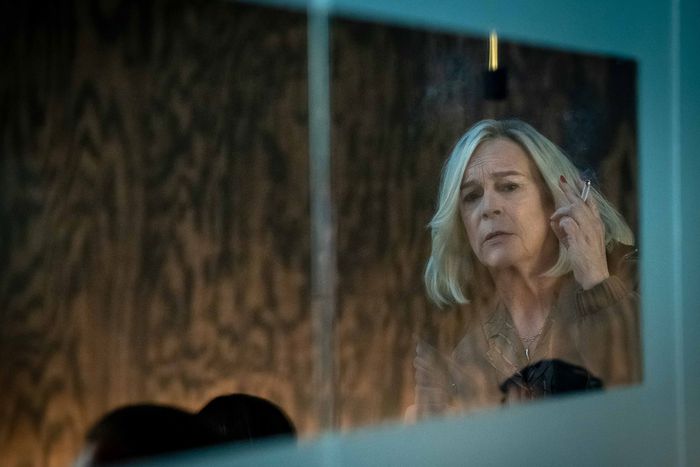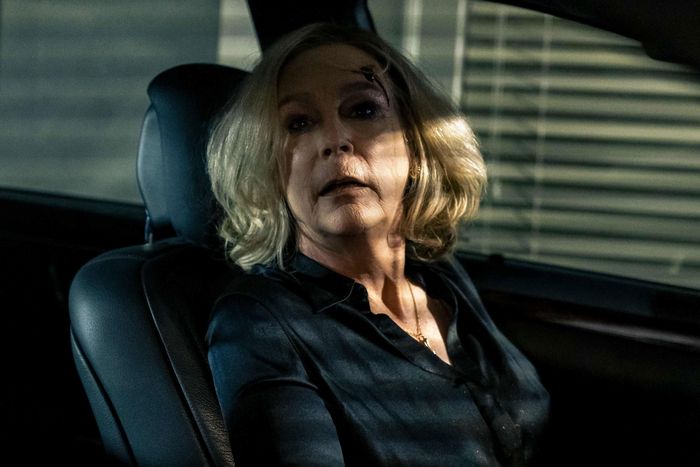
Spoilers ahead for The Bear’s second season, including the finale.
Carmy and Natalie are haunted figures, and in The Bear’s second season, we learn that Michael isn’t their only ghost. Also looming is Donna, the combustible, very much alive Berzatto matriarch played by Jamie Lee Curtis. She makes a brief appearance in the eponymous finale, showing up at the restaurant for Friends and Family night, but stops short of entering and lingers outside, a specter haunting her children. When Pete spots her through the window smoking in the blistering Chicago cold, he tries to get her inside, but she can’t bring herself to join. She can hardly stand anybody knowing she was there. “I don’t deserve to see how good this is,” she says. “I want them to have this good thing. I don’t want to hurt it.”
Donna is the Berzatto children’s foundational wound. Episode six, “Fishes,” breaks from the season’s present-day timeline and 30-minute format to deliver an extended installment that isn’t quite an origin story — they were already like this when we got here — but nevertheless illustrates why the siblings are such tortured souls. The setting is Christmas Day, about five years before. Michael’s still alive, Natalie’s hair is brown, and Carmy’s back from Copenhagen for the holidays. Christmas at the Berzatto house is a tornado stuffed in a bottle: a tempest of furious activity and extreme emotion. This is a common register for many extended families during the holidays, but the difference is Donna, an operatic mother with a drinking problem whose emotions are the sun her children orbit. The episode opens with Natalie, Michael, and Carmy sharing a quiet moment on the stoop, settling on a rough plan to navigate their mother in the evening ahead. They never stood a chance, in large part because Michael is himself a wild card, but the beat establishes the family’s prevailing psychological tempo: Donna is the shoe everyone’s waiting to drop.
Armed with a perpetually full wineglass, Donna spends the evening slaving over an extravagant meal. The kitchen bursts with dirty pans and splattered red sauce as timers constantly erupt, historically rooting a motif that runs throughout the series. Donna’s cooking a fleet of dishes simultaneously, and only she seems to know the design. Laboring in the kitchen is her way to express affection, but it’s also a source of deep resentment. “I make things beautiful for them, nobody makes anything beautiful for me,” she says to Carmy later in the evening, mascara streaking down her face. A figure who pulls in and lashes out, she remains locked in a vicious cycle of furiously giving her form of love while being dispositionally unable to receive any back.
Curtis doesn’t just play Donna big, but galactic. Instead of laughing, she falls dramatically to the floor. Yelling may be the Berzattos’ preferred form of communication, but she swings between screaming and crucifying with the sounds of a furious hellfire. The Berzatto clan is a chaotic bunch by default, and Curtis going that hard establishes Donna as a presence forceful enough to overwhelm everyone else’s bullshit. She’s a casting flex in an episode already stacked with celebrities fleshing out the family, including Bob Odenkirk, Sarah Paulson, John Mulaney, and Gillian Jacobs, but of the lot, Curtis is the genuine movie star. Her stature projects the gravitas of a mother whose children desire her love, and her deliriously frenzied performance delivers the storm they’re made to navigate in vain search of it. (Later, in “Forks,” The Bear deploys Olivia Colman in similar fashion, using her high-wattage presence to shed light on a legendary chef.)
For a show that excels at bottling anxiety, the tension in “Fishes” is unbearable. The emotional abuse builds as Carmy and Natalie attempt to placate their mother, who bullies and manipulates them in direct proportion to their offers of help. At dinner, Donna’s prolonged absence creates a concentrated space for the tension between Odenkirk’s Uncle Lee and Michael to reach fever pitch, and when Donna finally makes her grand entrance, the other shoe drops. She explodes in a fit of rage over the lack of appreciation afforded to her and storms off, prompting the simmering resentment between Michael and Uncle Lee to boil over into a brawl. That, in turn, is stopped in its tracks by Donna driving a car into the house. Amid Michael’s yells, Carmy fixates on a plate of cannolis, now christened with a fork that Michael threw.
The Berzatto children are indelibly shaped by Donna’s emotional swings. Michael suffered from intense self-loathing and similar volatility of the self that likely informed his eventual death by suicide. Natalie received the stinging cuts of Donna’s emotional lashes, and the fact that Pete — sweet, dim, milquetoast Pete — is her husband is a testament to how much she veered in the opposite direction, finding safe harbor in a man who’s basically human Wonder Bread. Even Donna uses this to her advantage: Outside the restaurant, she recognizes what she’s done to her children but only through the lens of her own narcissism, begging Pete to tell her it’s okay for her to leave and promise not to mention her appearance to Natalie. He acquiesces, providing Donna with her desired illusion of absolution and allowing her to drive a wedge into his marriage. It follows that Carmy’s far-flung adventures in the elite culinary world approximate an effort to both escape Donna and gain control over the chaos she ingrained in him; he might’ve been pushed in this direction as a fuck-you to his brother keeping him away from the Beef (revealed in hindsight as a way to protect him from the disastrous state of the business), but the therapeutic punch of high-level professional kitchens lies in their pristine systems. Nothing could be more different from the disorder of the Berzatto family kitchen than the exacting nature of Michelin-star restaurants.
The Bear portrays culinary work as a double-edged sword. It can be a vessel for self-realization: a space where the wayward can start over no matter how old they are, and where broken souls can find a path to wholeness. Food is also an archive of biographical memory, deeply embedded in one’s relationship to a family history, a broader tradition, and a nostalgia for the past. For Carmy specifically, the Berzattos’ central trauma is wrapped up in the cuisine. He seemed well on his way to grappling with it this season, attempting to reclaim the Christmas Day incident and honor his brother, through Marcus’s cannoli dish as well as what seems to be other aspects of the tasting menu. (At one point, a dish based on Donna’s “seven fishes” is heard being called for in the kitchen.) But the exacting nature of culinary work can also be a prison, a crutch to invest all of one’s time and self at the expense of becoming a full person. Indeed, in addition to inheriting anxiety and panic attacks, Carmy mirrors Donna’s inability to receive any sort of positive reinforcement. In “Pasta,” when Sydney asks him how it felt when he got the Michelin call, his response contains nothing good. “The first ten seconds felt like a sort of panic, because I knew I had to retain them, and then your brain does this weird thing where it bypasses any kind of joy and just attaches itself to dread,” he says.
The season finale ends in disaster. Not for the restaurant, as Friends and Family night ultimately succeeds, but for Carmy’s soul. Getting trapped in the walk-in refrigerator during service amounts to the worst of his fears being realized, exacerbated by how it was the direct result of Carmy splitting his focus between the restaurant and discovering the possibility of a fuller life through his reconnection with Claire. So he’s thrown into the worst possible feedback loop from the experience: With any good feeling comes disaster. During his outburst in the fridge, he echoes the sentiment Donna had uttered outside the restaurant just moments before about not deserving anything good. “I don’t need to receive any amusement or enjoyment,” he says. “And I’m completely fine with that, because no amount of good is worth how terrible this feels.” Claire overhears this, of course, and walks away, leaving Carmy seemingly doomed to remain trapped in his mother’s vicious cycle. Donna didn’t enter the restaurant, but she haunts him all the same.
More From This Series
- The 10 Best TV Needle Drops of 2024
- Vulture’s 25 Most-Read TV Recaps of 2024
- Big, Sweeping Television Is Back



